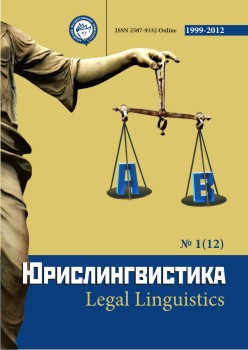ЛЕКСИЧЕСКИЕ СРЕДСТВА РЕАЛИЗАЦИИ АРГУМЕНТИРОВАНИЯ В АДВОКАТСКОМ ДИСКУРСЕ
Abstract
Статья посвящена исследованию языкового воплощения ргументирования в судебном адвокатском дискурсе. Аргументативное воздействие рассматривается с точки зрения использования трех типов апелляций: к эмоциям, ценностям и интеллекту. В статье рассматриваются виды данных апелляций, их функции и лексические средства их реализации.
Downloads
Metrics
References
Анисимова, Т. В. Риторическая аргументация / Т. В. Анисимова. – 2007. –
Режим доступа: www.volsu.ru/more/RES_C/tema/FYLOLOG
/del_rit2.rtf
Апресян, Ю. Д. Фундаментальная классификация предикатов / Ю. Д. Апресян.
– М., 2006.
Арутюнова, Н. Д. Язык и мир человека / Н. Д. Арутюнова. – М. 1999.
Волков, А. А. Курс русской Риторики [Электронный ресурс] / А. А. Волков. –
– Режим доступа: http://www.klikovo.ru/db/book/msg
Ивакина, Н. Н. Основы адвокатского красноречия / Н. Н. Ивакина. – М., 2002.
Николаева, Т. М. От звука к тексту / Т. М. Николаева. – М., 2000.
Порубов, Н. И. Риторика: учебное пособие / Н. И. Порубов. – М. 2001.
Хвесеня, М. И. Судебные речи по уголовным и гражданским делам / М. И.
Хвесеня. – Мн., 2005.
Copyright (c) 2017 Юрислингвистика

This work is licensed under a Creative Commons Attribution 4.0 International License.
The authors, which are published in this journal, agree to the following conditions:
1. Authors retain the copyright to the work and transfer to the journal the right of the first publication along with the work, at the same time licensing it under the terms of the Creative Commons Attribution License, which allows others to distribute this work with the obligatory indication of the authorship of this work and a link to the original publication in this journal .
2. The authors retain the right to enter into separate, additional contractual agreements for the non-exclusive distribution of the version of the work published by this journal (for example, to place it in the university depository or to publish it in a book), with reference to the original publication in this journal.
3. Authors are allowed to post their work on the Internet (for example, in a university repository or on their personal website) before and during the review process of this journal, as this may lead to a productive discussion, as well as more links to this published work (See The Effect of Open Access).











